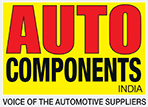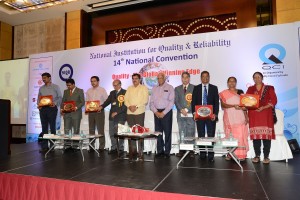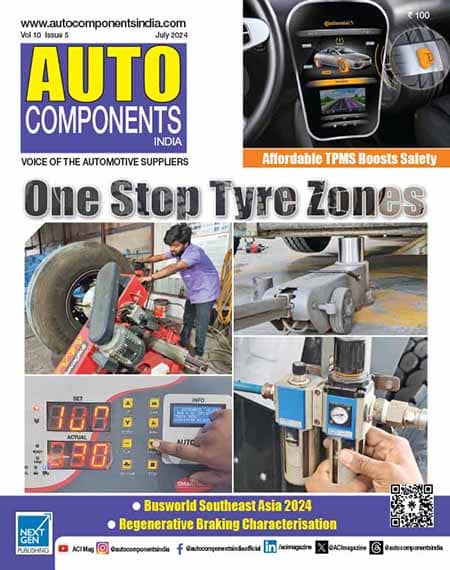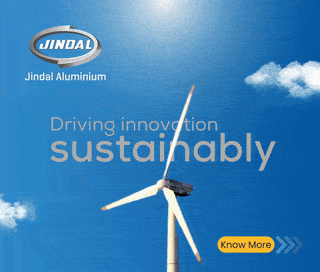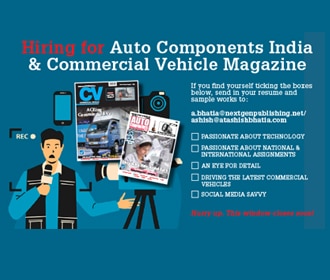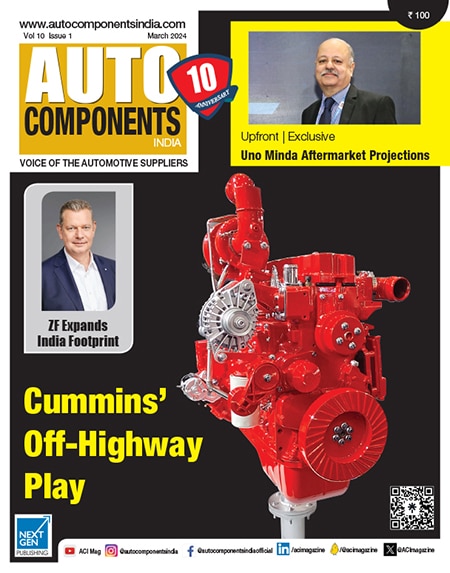Text: T Murrali
With a vision to provide strategic direction to the quality movement in India and to be an enabler in transforming the manufacturing and service industries and educational organisations, Chennai headquartered National Institution for Quality and Reliability (NIQR) along with Quality Council of India (QCI) organised the biennial National Convention with the theme ‘Quality – the Global Winning Edge.’
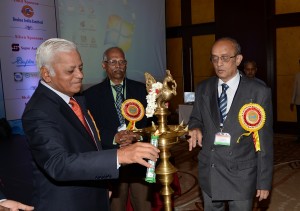 The 14th in the series was inaugurated by B Muthuraman, Vice Chairman, Tata Steel. Delivering the keynote address he said the quality movement, irrespective of the method, appears to be focused on fixing a problem but it should otherwise be looked at as an excellent opportunity to bring people together, empower them, make them think and energise them. “Quality movement is a significant process for leadership development,” he believes, adding that a good leader who can propagate quality should have two competing dimensions – the visionary and the architectural, since this would help strike a balance between creativity and analysis. Besides, the leader should have the ability to change the mindset of people and recognise the power of the workforce. The key attribute for any leader is to firmly believe the old adage – that customer is king.
The 14th in the series was inaugurated by B Muthuraman, Vice Chairman, Tata Steel. Delivering the keynote address he said the quality movement, irrespective of the method, appears to be focused on fixing a problem but it should otherwise be looked at as an excellent opportunity to bring people together, empower them, make them think and energise them. “Quality movement is a significant process for leadership development,” he believes, adding that a good leader who can propagate quality should have two competing dimensions – the visionary and the architectural, since this would help strike a balance between creativity and analysis. Besides, the leader should have the ability to change the mindset of people and recognise the power of the workforce. The key attribute for any leader is to firmly believe the old adage – that customer is king.
Chennai is not only Muthuraman’s hometown but also the city identified most with the Deming Prize and the Deming Grand Prize. He recalled the city’s unique distinction, which has to its credit organisations headquartered here that hold the maximum number of these awards. He was relating it to the quality movement prevalent in the city and the importance of this aspect for any business organisation.
Despite tens of thousands of books available on quality and management, not all companies succeed in their business. Quoting a study conducted by the Royal Dutch firm that analysed organisations existing for over a century, he said these firms continued the journey successfully due to a few factors including oneness with society, adaptability to change and financial prudence. He was not surprised at ‘quality’ not being the sole factor responsible for continued growth; he observed that it is only quality that glues all factors together. Quality, he feels, should be ingrained in the organisation, without which companies cannot empower people, which is quintessential for growth.
Recalling quality guru Professor Khano’s advice to sustenance of organisations, he said companies can be successful by adopting two methods – one to invest heavily in machines, men and other infrastructure. Second is to constantly improve and empower people in the organisation by challenging their own limits. The latter is far more powerful, profitable and sustainable than the former.
Though there are options for improvement by processes focusing on manufacturing, HR, market development etc, standardisation across departments with narrowing limits of variability will lead to higher levels of growth. Though monotonous, he vouched for continuous practiseas it would lead to innovation, which can give the organisation a unique edge over others. “Innovation comes out of solid mind and knowledge,” he said. It was innovation, together with several initiatives including Total Preventive Maintenance and 6 Sigma coupled with continuous improvement taken up by Tata Steel from 1990 that enabled it to become the lowest cost producer of steel in the world about a decade later.
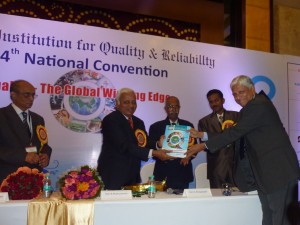 As part of the programme, Muthuraman released the Souvenir of NIQR.The 2-day event addressed the immediate need of bringing together professionals from across the industry spectrum on a single platform to devise strategies for future endeavours to make quality the way of life. In total there were seven sessions – Innovation, Cost Competitiveness, Bench-marking Practices, Skill Development & Quality education, Role of Leadership, Reliability Engineering and Organisational Culture.
As part of the programme, Muthuraman released the Souvenir of NIQR.The 2-day event addressed the immediate need of bringing together professionals from across the industry spectrum on a single platform to devise strategies for future endeavours to make quality the way of life. In total there were seven sessions – Innovation, Cost Competitiveness, Bench-marking Practices, Skill Development & Quality education, Role of Leadership, Reliability Engineering and Organisational Culture.
Chairing the session on Innovation, the Director, India Pistons, R Mahadevan said economic development comes only by competitiveness which is directly proportional to innovation. Despite being one of the smallest countries in the world, Iceland is one among the top 15 countries leading in innovation, pioneering in geothermal engineering. B Viswanath, Head of Engineering & Development, Delphi-TVS Diesel Systems Limited said the challenge of any innovation lies in commercially converting the invention, though he affirmed that innovation will drive growth, create jobs and build wealth besides revitalising the organisation. According to him speed is the key in innovation, and only about 20% of it is feasible for commercial conversion.
Recalling George Bernard Shaw, the Consultant from Creativity and Innovation, Annamalai Natarajan said a reasonable man adapts himself to the world while the unreasonable man expects the world to adapt to him. Therefore, all progress depends on the unreasonable man. He asked the audience to be unreasonable in their thinking so that it would lead to innovation. Instead of asking someone: ‘will you complete the work by 5 pm,’ he said it would be better to ask him, ‘how will you complete the work by 5pm.’ Recollecting the research done by Boeing on anti-gravity material, he said more than ideas, dreaming is necessary as it would help bring out radical inventions.
Addressing the session on Skill Development and Quality Education, theMD and CEO of National Skill Development Corporation (NSDC), Dilip Chenoy said success in the past will not ensure success in future unless quality is propagated continuously. There is a huge difference between the world of work and the world of education – the challenge is to bridge the gap. NSDC has a three-pronged approach – first to create the vision and help define the path, second, to fund by demonstrating commitment to the purpose and lastly to allow creation of a viable ecosystem. Talking on the transformation of skill development ecosystem he said it is necessary to have standards, quality and outcome as bench-marks.
On the characteristics and features of world class universities, Professor JAK Tareen, Vice Chancellor, BS Abdur Rahman University, said the hype that began in 2003-04 is more on the ratings based on several aspects including infrastructure, mix of student community and a holistic approach to education. Rapid change in dynamics of higher education with changing kinetics of global economic order and employment patterns demand newer skills and exposure. Institutions need to have a complete ecosystem comprising the major streams of higher education as it is not possible to produce a complete engineer unless he is exposed to science and other professions. Indian Universities have several challenges including lack of autonomy and negative political interference, lack of synergy between academia and government, and poor infrastructure. He suggested that government should set targets for optimal users of space and resources, increase capacities of institutions by 100% to reach critical mass and open up the institutions for overseas employment. He concluded by saying that spending 6% of the GDP on higher education will take the country to greater heights.
Shrihari Udupa, Executive Director, Nettur Technical Training Foundation (NTTF) said there was a huge gap between various stakeholders and the challenge is to bridge it. Germany has 30 million apprentices while India has only 3 lakh. This is vital since the potential of the people determine the potential of the organisation. Thinking and executing processes should be inculcated from the grass root level rather than be driven by the higher-ups, he opined.
Chairing the session on the Role of Leadership, R Sivanesan, Special Director, Central Quality, Ashok Leyland said quality initiatives can impart significant positive change in the organisation. Dr V Shantha, Chairman, Cancer Institute spoke on the need for commitment from everyone in an organisation. The secret of success lies in completing today’s work before the end of the day, she said. T T Srinivasaraghavan, Managing Director, Sundaram Finance Limited, opened up his address by saying that great leaders are great listeners. Experience does not help as times are changing fast. If a leader is willing to listen, then it would lead to learning. Empathy is the key, as it will help understand the views of people in the value chain, and enable corrective action.
The ability to articulate one’s belief and vision will help achieve expectations. The leader should be decisive, empower people and become a role model for others.
According to Manoj Jaiswal, Senior Vice President and Head of Management Development Centre of Murugappa Group, the role of a leader is to stretch boundaries. Sharing his thoughts on the Business Leadership Programme of Murugappa Group, he said it adopts three methods -reflective learning, conceptual learning and action learning. The programme empowers the candidates with several capabilities; helps them in bonding besides executing teamwork. Of the 11 batches completed so far, the programme developed 75 leaders; of them 2 are managing directors.
Talking at the session on Reliability and Engineering, the Director of Institute of Quality and Reliability, Hemant Urdhwareshe observed that the warranty costs for Japanese companies is half that of their American counterparts. According to him, the foundations of high reliability, amongst others, are motivated and skilled people who have passion to improve, clear strategies for technology, design & manufacturing, a robust validation mechanism and the willingness to go beyond specifications.Reliability is a result of planned activities including marketing and product strategy, with a structured problem solving process that is useful for current as well as new products.The design for reliability, according to S Sudarsanam, Assistant General Manager – Product Development, Ashok Leyland, should encompass life data analysis, customer usage pattern, reliability prediction and reliability demonstration.
Earlier, the session on Cost Competitiveness was participated in by R Shankar, CEO, TVS Logistics, S Bhargav, Head- Operations, Rane Brake Linings and B Venkat Subramaniam, Executive Director – Corp Strategy and Planning, Ashok Leyland. The session on Benchmarking Practices saw L Prabhakar, Head HR, ITC Limited, Anantha Subramaniam, Associate Director (Manufacturing process consulting-South Asia), Frost & Sullivan and T Sarangarajan, Vice President, Hyundai Motors, as participants.
The event also witnessed a session on Organisational Culture participated in by Dr G Natchiar, Vice President, Aravind Eye Hospital, Anand Sen, President, TQM & Steel Business, Tata Steel and Swami Satyajnananandaji, Secretary, Ramakrishna Mission Students’ Home.
Recognition
As part of the convention NIQR honoured the champions of quality with awards. To administer the awards, the institution has developed suitable criteria for each type in line with Japanese Union of Scientists and Engineers (JUSE) that awards the Deming prize, American Society of Quality Control and European Organisation for Quality Control. The selection criteria includes leadership philosophy, employee involvement/ development, TQM principles, business / marketing strategies, bench-marking practices, R&D initiatives, customer satisfaction and overall performance results covering financials, market share etc for the last 3 years.
NIQR-GKD award for Outstanding Organisation 2014 was given to Maruti Suzuki India. Receiving the award Ajay K Tomar, Executive Director (QA), Maruti Suzuki said Indian industry has come a long way on the quality journey. Despite being an endless journey it is necessary to continue so that, “we can show to the world India is capable of producing quality products.”
L Ganesh, Chairman, Rane Group was bestowed with NIQR-Bajaj Auto award for Outstanding Quality Man -2014. In his acceptance speech, Ganesh said he was dedicating this award to all the employees of Rane group. Recalling the meeting he participated in, in the late 1980s, perhaps his first exposure to TQM, Ganesh said even one ppm defect was not acceptable by a popular television company in Japan, while representatives from India were delighted at lower ppm levels. “The role of organisations like NIQR will never end as we have a long way to go in improving quality,” he added.
NIQR -Lucas-TVS award for Outstanding Service Organisation – 2014 was given to Self Employed Women’s Association (SEWA), Gujarat. The award was received by the President of SEWA, Kapilaben Vankar and General Secretary Jyoti Macwan.
The NIQR- Susira award for Outstanding Small Scale Industry – 2014 was presented to Anusham Industries, Chennai. Accepting the award the Managing Director of the company D Prabhu recalled his exposure at India Pistons Limited where he began his career as a quality professional. “We followed ‘dreaming, thinking, planning, performing and achieving,’ as the formula to achieve our goals. This made us to supply at zero ppm to few of our customers including Ashok Leyland.”
NIQR-TVN Kidao award for Outstanding Educational Institution – 2014 was given to Sasi Institute of Technology and Engineering (SITE). Receiving the award the Chairman of the institution Burugupalli Venugopala Krishna said it is an encouragement for the group to continue educating rural India.
Felicitating the awardees, the Chairman and Managing Director of India Pistons, N Venkataramani said great accomplishments of corporates and individuals need to be recognised as it would help kindle the spirit of others to achieve their goals. After Maruti’s entry into the Indian auto market – quality, cost and delivery became key parameters to sustain the business. Despite continuing for so long the vehicle manufacturer is raising the bar year on year. The challenge lies in managing and satisfying expectations. Complimenting the Rane Group, he said next to Toyota Rane is the second organisation in the world to be honoured with the highest number of Deming awards. The group received 4 Deming Prizes and 3 Deming Grand Prizes. Ganesh’s significant leadership is a testimony to the enormous commitment that drove the culture of quality in his organisations. Venkatramani also complimented Anushum Industries for its commitment to supply quality components.
Delivering his presidential address the Principal Secretary – Industries, Government of Tamil Nadu C V Sankar said, “This award is yet another jewel in the crown of the awardees that have already received several recognitions; it will also enthuse many more organisations.” According to him quality is very difficult to achieve since it is related to the mindset. To achieve this objective the intent has to be imbibed in every cell of the body. It is difficult to implement it, and more difficult to sustain. Recalling his recent visit to the world heritage sites in Tamil Nadu that are known for quality sculptures, he said the state has traditionally been a home to such outstanding quality. “Practicing quality is a culture and it is necessary to ingrain it in our mindset,” he concluded. (END)
BOX
Size does not matter: B Muthuraman, Vice Chairman, Tata Steel
Quality can be practised irrespective of the size of the organisation. It is necessary to recognise the power of the workforce and the choice is entirely with the management of the company. The workforce must know to what extent their efforts lead the organisation in the journey. When they do things differently they should know the cause and effect of their initiatives.
Taking the quality culture through the value chain is a time-consuming process. However, the leaders must consistently make an attempt in this regard—using proper communication, walking the talk, demonstrating examples, and mobilising cross-functional task forces. It is a continuous effort, and does not come about by merely attending programmes; it has to be ingrained in the people, a process that could take a long time.
